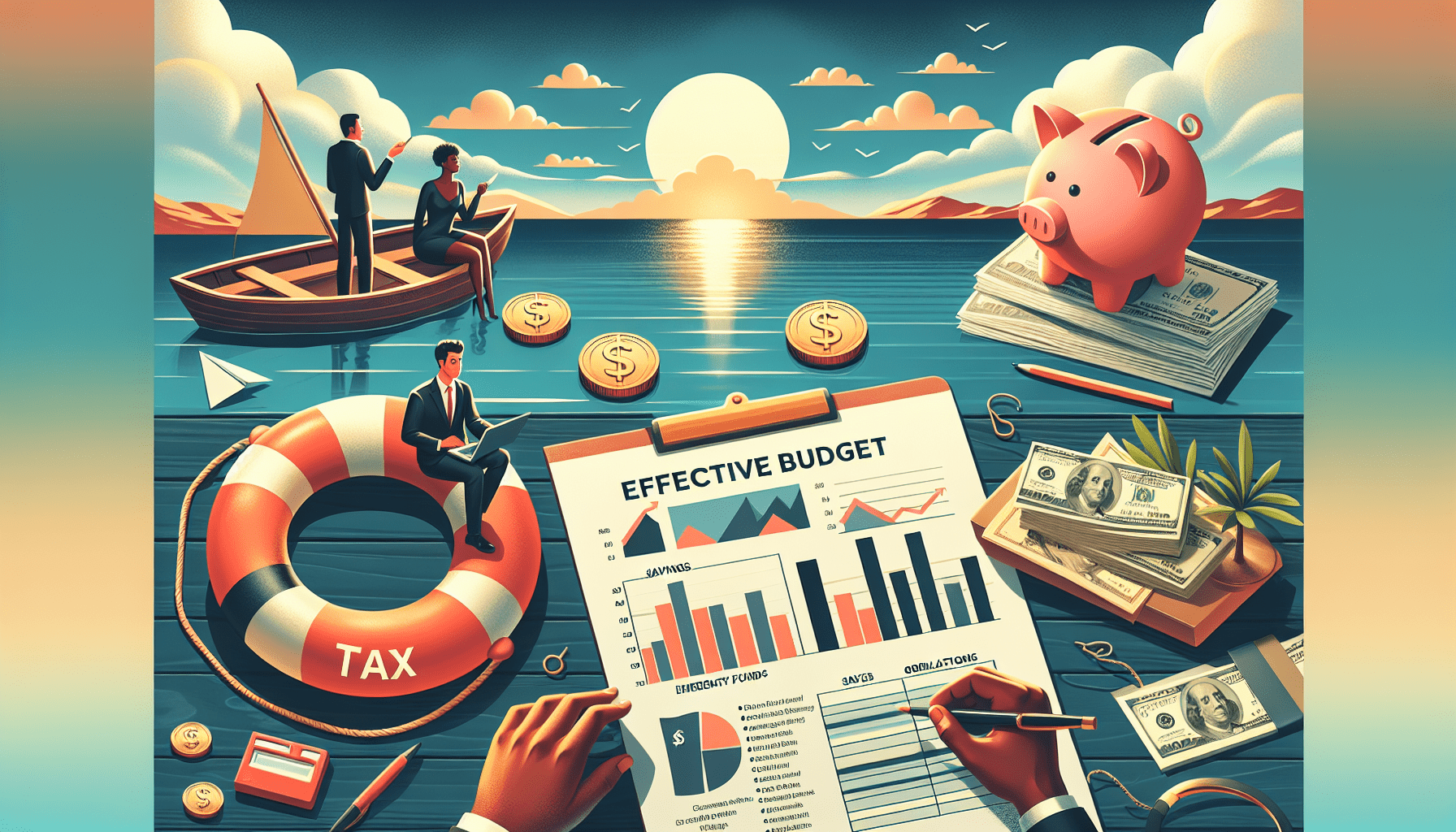Are you a freelancer looking to achieve success in your career? If so, then you need to prioritize your financial planning. In this article, we will provide you with essential tips that can help you navigate the world of freelancing and ensure a successful and stable financial future. From budgeting effectively to managing your taxes, these tips will empower you to take control of your finances and thrive as a freelancer. So, let's dive into the world of financial planning for freelance career success together!
Setting Financial Goals
When it comes to freelancing, setting financial goals is crucial for achieving long-term success. Before you can begin planning your financial future, it is important to evaluate your financial needs. Take a closer look at your current financial situation and determine what you need to achieve financial security. This evaluation will help you set realistic and achievable goals.
Once you have a clear understanding of your financial needs, it is time to set both short-term and long-term financial goals. Short-term goals can include things like paying off credit card debt, saving for a vacation, or purchasing new equipment for your business. Long-term goals, on the other hand, might include saving for retirement or buying a home. By setting both types of goals, you will have a clear roadmap for your financial journey.
Tracking your progress is crucial for staying on top of your financial goals. Make it a habit to regularly review your progress and adjust your goals as needed. This will help you stay motivated and ensure that you are on track to achieve your desired financial outcomes.
Creating a Budget
Creating a budget is an essential step in managing your finances effectively as a freelancer. To create a budget, start by calculating your income. This includes any money you earn from your freelance work, as well as any other sources of income you may have.
Next, determine your fixed and variable expenses. Fixed expenses are recurring monthly costs that stay relatively stable, such as rent or mortgage payments, utilities, and insurance premiums. Variable expenses, on the other hand, are costs that can change from month to month, such as groceries, entertainment, and transportation.
It is also important to allocate funds for taxes. As a freelancer, you are responsible for paying your own taxes. Be sure to set aside a portion of your income to cover your tax obligations. Consider consulting with a tax professional to ensure you are setting aside the appropriate amount.
Identifying areas for cost-cutting is another important aspect of creating a budget. Look for ways to reduce your expenses without sacrificing your quality of life. This can include things like cutting back on unnecessary subscriptions or finding more affordable alternatives for everyday expenses.

This image is property of pixabay.com.
Building an Emergency Fund
Having an emergency fund is essential for financial security, especially for freelancers. Without the certainty of a steady paycheck, unexpected expenses or a decrease in income can cause significant financial stress. It is recommended to save at least 3-6 months of living expenses in your emergency fund.
To make saving for your emergency fund easier, consider automating regular contributions. Set up automatic transfers from your main bank account to your emergency fund on a consistent basis. This way, you won't have to rely on remembering to save or making the decision each month. Automating your contributions ensures that you are consistently building your emergency fund.
Managing Cash Flow
Managing cash flow effectively is crucial for freelancers. One way to do this is by maintaining separate business and personal accounts. Mixing your personal and business finances can lead to confusion and make it difficult to track your income and expenses accurately. By keeping your accounts separate, you can easily monitor your business finances and ensure that you are staying within your financial goals.
Establishing a system for tracking income and expenses is another important step in managing cash flow. This can include using a spreadsheet, a financial tracking app, or accounting software specifically designed for freelancers. Find a system that works best for you and make it a habit to consistently update your financial records.
Consider using accounting software or apps to streamline your financial management. These tools can help you easily track business expenses, generate reports, and prepare for tax season. Investing in the right software or app can save you time and help you stay organized.

This image is property of pixabay.com.
Paying Taxes
Understanding your tax obligations as a freelancer is essential for avoiding any future financial headaches. Freelancers are responsible for paying self-employment taxes, as well as income taxes. It is important to educate yourself on the specific tax regulations in your country or region.
Keeping records of your income and expenses is crucial for accurate tax filing. Keep track of every payment received and every expense related to your freelance business. This will make it easier to calculate your taxable income and ensure that you are claiming all eligible deductions.
Set aside money for quarterly tax payments to avoid any surprises during tax season. Freelancers are typically required to make estimated tax payments throughout the year. By setting aside a portion of your income each month, you can be prepared when these payments are due.
Consider seeking professional tax advice to ensure you are maximizing your deductions and optimizing your tax strategy. A tax advisor or accountant who specializes in working with freelancers can offer guidance and help you save money in the long run.
Investing for Retirement
As a freelancer, it is important to start saving for retirement early. Unlike employees who may have access to employer-sponsored retirement plans, freelancers must take their retirement savings into their own hands. Starting early allows you to take advantage of the power of compound interest and gives you more time to build a secure financial future.
Explore retirement account options for freelancers, such as a Simplified Employee Pension (SEP) IRA or a Solo 401(k). These retirement accounts are designed specifically for self-employed individuals and offer tax advantages that can help you save for the future.
Considering working with a financial advisor who specializes in retirement planning can also be beneficial. They can help you develop a personalized retirement plan based on your individual financial situation and goals. A financial advisor can also provide ongoing guidance and support as you navigate the complexities of retirement savings.

This image is property of pixabay.com.
Managing Debt
Managing debt is an important aspect of financial planning for freelancers. Creating a plan to pay off debt is the first step in regaining control of your financial situation. Start by listing out all of your debts, including credit card debt, student loans, or any other outstanding loans.
Once you have a clear understanding of your debts, prioritize paying off high-interest debts first. High-interest debts can quickly accumulate and become a financial burden. By focusing on paying off these debts first, you can save money in interest payments in the long run.
Negotiating interest rates and payment terms with lenders or creditors is another strategy for managing debt. If you are struggling to make payments, reach out to your creditors and discuss your situation. They may be willing to work with you to lower interest rates or set up a more manageable payment plan.
Protecting Yourself and Your Business
As a freelancer, it is important to take steps to protect yourself and your business from potential risks. One way to do this is by obtaining appropriate insurance coverage. Depending on the nature of your freelance work, you may need professional liability insurance, general liability insurance, or other types of coverage. Research different insurance options and consider consulting with an insurance agent to determine what coverage is necessary for your business.
Consider forming a legal business entity, such as a limited liability company (LLC), to separate your personal and business liabilities. This can provide you with legal protection and help safeguard your personal assets. Consult with a lawyer or business professional to determine the best legal structure for your freelance business.
Having contracts in place for client work is another important aspect of protecting yourself and your business. Clearly define the scope of work, payment terms, and any other important details in a written contract. This will help prevent any misunderstandings or disputes with clients and ensure that both parties are on the same page.

Diversifying Your Income
As a freelancer, it is important to explore multiple sources of income to enhance your financial stability. Relying solely on one client or one type of work can be risky. Look for opportunities to diversify your income by taking on different types of projects, expanding your client base, or exploring additional streams of income.
Creating passive income streams is another way to add stability to your finances. Passive income refers to income that is generated with minimal effort or ongoing work. This can include things like selling digital products, earning royalties from creative work, or investing in rental properties. By creating passive income streams, you can generate additional income even when you're not actively working.
Investing in developing new skills is also essential for diversifying your income. As technology evolves and industries change, it is important to stay ahead of the curve. Identify skills that are in demand and invest in expanding your knowledge and expertise. This can open up new opportunities and increase your earning potential.
Seeking Professional Financial Advice
When it comes to financial planning, seeking professional advice can be extremely beneficial. Consider consulting a financial planner or advisor who specializes in working with freelancers. They can help you develop a comprehensive financial plan tailored to your individual needs and goals.
Getting guidance on tax planning and investment strategies from a professional can also provide valuable insights. A financial advisor can help you optimize your tax strategy and identify investment opportunities that align with your risk tolerance and financial goals.
Make it a habit to review your financial plan regularly. As your business and personal circumstances change, it is important to reassess your goals and make adjustments as needed. Regularly reviewing your financial plan will help ensure that it remains aligned with your evolving needs and objectives.
In conclusion, taking the time to set financial goals, create a budget, build an emergency fund, manage cash flow, pay taxes, invest for retirement, manage debt, protect yourself and your business, diversify your income, and seek professional financial advice are essential steps for achieving financial success as a freelancer. By following these tips, you can lay a solid foundation for a secure and prosperous freelance career. Remember, financial planning is an ongoing process, so make it a priority to regularly review and adapt your financial strategies as needed. With the right mindset and strategies in place, you can thrive as a freelancer and achieve your financial goals.


